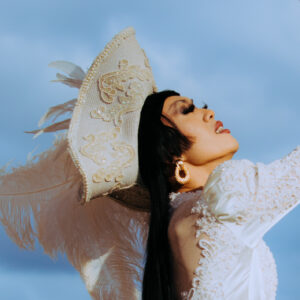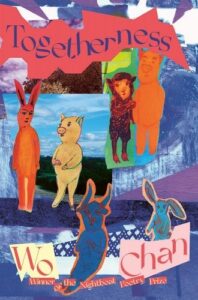Wo Chan
the smiley barista remembers my name
What do sandwiches, laundry, therapy, childhood homes, and forgiveness have to do with each other? Wo Chan weaves a poem that charts the many things a single day can hold.
We’re pleased to offer Wo Chan’s poem, and invite you to connect with Poetry Unbound throughout this season.

Image by Annisa Hale/ Film processed by Moody's Film Lab, © All Rights Reserved.
Guest

Wo Chan is a poet and drag artist who performs as The Illustrious Pearl. They are a winner of the Nightboat Poetry Prize and the author of Togetherness (Nightboat Books, 2022). Wo has received fellowships from MacDowell, New York Foundation of the Arts, Kundiman, The Asian American Writers Workshop, Poets House, and Lambda Literary. Their poems appear in POETRY, WUSSY, Mass Review, No Tokens, The Margins, and elsewhere. As a member of the Brooklyn-based drag/burlesque collective Switch N’ Play, Wo has performed at venues including The Whitney Museum of American Art, National Sawdust, New York Live Arts, and the Architectural Digest Expo. Find them at @theillustriouspearl.
Transcript
Transcription by Alletta Cooper
[music: “Praise the Rain” by Gautam Srikishan]
Pádraig Ó Tuama: My name is Pádraig Ó Tuama, and years ago I worked with somebody when I was about 20, and then didn’t work with them for ages. And about 10 years later, when I was 30, I worked with them again. And we were in a meeting and they asked me a question and I gave my opinion and he looked at me and said, “My God, look who’s grown up.”
And there was something in that that made me — it gave me a chapter change to go, “God, I suppose I have, something has changed.” And you change in response to other people. But also I think your own voice changes, your own voice back to yourself, where what it is I said to myself about myself when I was 20, I don’t have to say that when I’m 30 or 40 or 50. That change is an invitation in art as well as in human experience.
“the smiley barista remembers my name” by Wo Chan
“beauty on earth so blue, even the cheese flowers
a culture with no democracy… Yesterday (for example),
I ate the same sandwich I eat every week: eggplant
roasted in red pepper aioli, a focaccia jammed full
by arugula, capers sweaty in browned butter. How
have I come to love routine? I’m thirsty and abashed.
The fabric of my childhood underwear triple axles in the wind—wow.
The whole neighborhood watches me do emails, go to therapy: she shed
“revenge for forgiveness. I said it, “i forgive you” slipping
like a key beneath a door, where never was a house attached.
Is it beauty on earth, so blue? Each side stalled, you are touched.
Withstanding the sun, its fat macula borne down grips
(i wish! i saw! i fear! i heard! i dream) like an emotion.
This is not a feeling. This can be, I think, a conversation.”
[music: “Slate Tracker” by Blue Dot Sessions]
This poem was published originally on the Poetry Foundation and it had a slightly different title, which was “june 8, the smiley barista remembers my name.” And that gives me a bit of a thought, as well as reading some interviews with Wo Chan, where it was a poem whose narrative is held together by all the things that were happening on one day. And so perhaps because it was June, the sky was particularly blue. And the cheese flowers, about perhaps what was being eaten. And certainly, then there’s that gorgeous sandwich that’s being described that always makes me hungry whenever I read it. But very quickly, the poem isn’t just a list of things that are happening because it continues to reflect on itself. Right after the “capers sweaty in browned butter.” I salivate when I read that line. But then the question: “How / have I come to love routine?” and “I’m thirsty and abashed.”
There is a way within which this poem is paying attention to itself, where the poet is paying attention to themself, and the self-reflective, self-conscious nature of seeing change, of seeing maturity. It feels like the reference to the conversation at the end, as well as this internal conversation about forgiveness as the poem continues. All of those things feel like they’re paying attention to what it is that’s flourishing, maturing, deepening.
[music: “Ultima Thule” by Blue Dot Sessions]
The poem is in two stanzas. It’s a sonnet. It’s 14 lines, and so there’s eight lines followed by six. And the first stanza finishes with these two lines: “The fabric of my childhood underwear triple axles in the wind—wow.” And then the next line, “the whole neighborhood watches me do emails, go to therapy.” And I feel like that is in a certain sense, the axle of this sonnet where two experiences are being put together: one childhood underwear in the wind, and “wow” — what is that? It’s being embarrassed. It is something out in public about your youth, perhaps is being referred to.
And then, “The whole neighborhood watches me do emails, go to therapy.” What is it like to know that people are seeing you growing up, and you feel like you’re being beheld in growing up or going through a change in your life? Who knows what it is that’s being referred to here, but it does seem like it’s all preparing the way for this magnificent and powerful and repeating term of forgiveness. “She shed // revenge for forgiveness. I said it, ‘i forgive you’ slipping / like a key beneath the door, where never was a house attached.”
Forgiveness is one of those words that can often be hard to use, because so often, what it is that I think forgiveness means is what I project into whenever I see somebody else write it or say it. But forgiveness in the poem is a key to a door that was slipped under a door. But also, it is that when you realize that you’ve slipped this key under the door — a door, perhaps, that’s keeping somebody out or keeping somebody in — you realize there wasn’t a house attached to the door.
We don’t know who or what’s being forgiven and no clue. And I love the openness of all of that, then, because it appeals to me to think: Where is it that I’m looking for forgiveness? Where is it that I’m wanting to give it, and what is it that I would put as the alternative perhaps to forgiveness? Would I speak about revenge for forgiveness? Or would I talk about bitterness for forgiveness or something else? How is it that I would bring my own definition into that?
[music: “Every Place We’ve Been” by Gautam Srikishan]
In the midst of listing some very concrete, even visible things, the language in this poem is always wanting to become a little bit cosmic. “Is it beauty on earth, so blue?” and then speaking about “withstanding the sun.” There’s this list of verbs: “i wish! i saw! i fear! i heard! i dream.” Why would you need to withstand the sun? The line is, “Withstanding the sun, its fat macula borne down grips.” “Like an emotion” — that bit “like an emotion” comes after these other verbs, but they’re in brackets. So it is about withstanding the sun and somehow feeling held together by something like an emotion.
But the poem resolves to say: “This is not a feeling.” And saying instead: It’s a conversation. So rather than just being at the mercy of the sun and its fat macula, its focus, its absolute precision, its heat. This is saying, I’m in conversation with the sun. Is the sun an image in the poem that’s referring to whatever it is that was causing pain? That thing that can cause growth, but actually you shouldn’t be too long in it? I don’t know. But somehow Wo Chan knows that they’re in conversation back with the sun. And I love the image of that there, that the brightness of the sun can be something that you can say, “I can turn to the thing that might have on the one hand given heat, and on the other hand burnt, and I can say something back.”
[music: “The House You Wake In” by Gautam Srikishan]
Titling a poem is always an interesting thing. Sometimes you want to title a poem in a way that it opens up the door to the poem, or there’s something where as the poem unfolds, you feel like you were given a little crumb in the title. Other times you want the title to be in contrast, or you want the title to respond to the emotion of the poem without having any particular key into it.
And “the smiley barista remembers my name” — who is this smiley barista? And what I love is that this is a poem of such expansion. It feels to me like the poem is a poem about the inner life and having found some routines as well as found the capacity to bear witness to what’s flourishing inside of you. This forgiveness, that really does sound like a very positive experience of forgiveness. In the midst of that, so much else becomes possible to comprehend, to perceive, to accept — even the joy about the smiley barista remembering the name of the poet.
[music: “The House You Wake In” by Gautam Srikishan]
“beauty on earth so blue, even the cheese flowers
a culture with no democracy… Yesterday (for example),
I ate the same sandwich I eat every week: eggplant
roasted in red pepper aioli, a focaccia jammed full
by arugula, capers sweaty in browned butter. How
have I come to love routine? I’m thirsty and abashed.
The fabric of my childhood underwear triple axles in the wind—wow.
The whole neighborhood watches me do emails, go to therapy: she shed
“revenge for forgiveness. I said it, “i forgive you” slipping
like a key beneath a door, where never was a house attached.
Is it beauty on earth, so blue? Each side stalled, you are touched.
Withstanding the sun, its fat macula borne down grips
(i wish! i saw! i fear! i heard! i dream) like an emotion.
This is not a feeling. This can be, I think, a conversation.”
[music: “Praise the Rain” by Gautam Srikishan]
Chris Heagle: “the smiley barista remembers my name” comes from Wo Chan’s book Togetherness. Thank you to Night Boat Books who gave us permission to use Wo’s poem. Read it on our website at onbeing.org.
[music: “Praise the Rain” by Gautam Srikishan]
Poetry Unbound is: Gautam Srikishan, Eddie Gonzalez, Lilian Vo, Lucas Johnson, Amy Chatelaine, Kayla Edwards, Annisa Hale, and me, Chris Heagle.
Our music is composed and provided by Gautam Srikishan and Blue Dot Sessions.
This podcast is produced by On Being Studios, which is located on Dakota land. Open your world to poetry with us by subscribing to our Substack newsletter. You may also enjoy Pádraig’s new book, Poetry Unbound: 50 Poems to Open Your World. For links and to find out more visit poetryunbound.org.
Books & Music
Recommended Reading
The On Being Project is an affiliate partner of Bookshop.org and Amazon.com. Any earnings we receive through these affiliate partnerships go into directly supporting The On Being Project.








